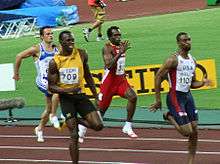
Run! Run, like the devil's behind us. Run, to where no one can find us. ~ Alessia Cara
_wins_the_100_metres_race_-_ISTAF_2006_-_Berlin%2C_3_September.jpg)
After erroneous reports of a pack of “wretched women” runners ruined at the 1928 Summer Games, the Olympics eliminated all women’s events that stretched beyond 200 meters. In 1967, commentators told Kathrine Switzer that her uterus would collapse if she competed in the Boston Marathon (she finished, and it did not). Women didn’t gain clearance to compete in all the track events available to men at the Olympics until 2008. As women demolished the cultural barriers to competition, Epstein writes, they swiftly gained on men, prompting some commentators to argue that they’d eventually outrun them. But their quickening pace soon plateaued, while male runners are still “ever so slightly pulling away.” ~ Amanda Hess
.jpg)
If we wanted simply to see the fastest runners, we could have cheetahs race instead of humans. ~ David Epstein
Running is a means of terrestrial locomotion allowing humans and other animals to move rapidly on foot. It is simply defined in athletics terms as a gait in which at regular points during the running cycle both feet are off the ground, in contrast to walking, where one foot is always in contact with the ground. Ancestors of mankind developed the ability to run for long distances about four and a half million years ago, probably in order to hunt animals. Competitive running grew out of religious festivals in various areas.
Quotes
- Run! Run, like the devil's behind us. Run, to where no one can find us. Be my compass.
- Alessia Caracciolo, "Outlaws", Know-It-All (2015), Def Jam
- Now, here you see, it takes all the running you can do, to keep in the same place. If you want to get somewhere else, you must run at least twice as fast as that!
- Lewis Carroll, Through the Looking-Glass, chapter 2.—Logical Nonsense: The Works of Lewis Carroll, ed. Philip C. Blackburn and Lionel White, p. 177 (1934). First published in 1872.
- After erroneous reports of a pack of “wretched women” runners ruined at the 1928 Summer Games, the Olympics eliminated all women’s events that stretched beyond 200 meters. In 1967, commentators told Kathrine Switzer that her uterus would collapse if she competed in the Boston Marathon (she finished, and it did not). Women didn’t gain clearance to compete in all the track events available to men at the Olympics until 2008. As women demolished the cultural barriers to competition, Epstein writes, they swiftly gained on men, prompting some commentators to argue that they’d eventually outrun them. But their quickening pace soon plateaued, while male runners are still “ever so slightly pulling away.” Today, the male world-record holder in the 100-meter sprint is 10 percent faster than the female record holder. The fastest male marathoner also boasts a 10 percent advantage over the fastest woman. This gap is not exclusive to running: In speedskating, the gulf is 9 percent; in the long jump, it’s 19 percent; in weightlifting, it’s 25 percent.
Epstein argues that these physical and ability differences shouldn’t be leveraged to make a cultural determination about the relative worth of men and women’s sports: “If we wanted simply to see the fastest runners, we could have cheetahs race instead of humans,” he writes. “We must be vigilant to ensure that all women who want to compete have the opportunity to do so, but the idea that women’s athletic performances must be equivalent to men’s in order to be deemed remarkable belittles the achievements of female competitors.”- Amanda Hess, "Why We Love Watching Female Figure Skaters, But Not Female Basketball Players", (magazine)|Slate, Feb 10, 2014
- All day he ran. He did not rest. He seemed made to run on forever. His iron-like body ignored fatigue. And even after fatigue came, his heritage of endurance braced him to endless endeavour, and enabled him to drive his complaining body onward.
- Jack London, White Fang (1905).
- He can run. But he can't hide.
- Joe Louis, remark to a reporter prior to the Joe Louis—Billy Conn boxing match (June 19, 1946); reported in Louis, My Life Story (1947), p. 176.
- Woah, look over here
We got a cute little ol' runner to the right
Blue shorts, no shirt
Whoo! You're looking good darling
That's right, stay in shape- KT Oslin, "Younger Men", "80's Ladies" (1987)
- Is track and field really a professional sport?
For Usain Bolt, it is. A Forbes magazine survey released this month estimated the Jamaican sprinter's annual earnings at $23.2 million, ranking 45th on a list of the world's richest athletes.
What about Kind Butler III?
He is a world record-holder, too, albeit in a relay. The Indianapolis sprinter estimated his 2013 earnings from track: $6,000, or about 4,000 times less than Bolt. That underscores a challenge facing American athletes and their Indianapolis-based governing body, USA Track & Field. - Max Siegel, CEO of USATF for two years, is a former president of global operations for Dale Earnhardt Inc. He said he is "perplexed that there is this angst toward the shoe companies" that he didn't find toward automakers in NASCAR.
"I'm careful with it because they'll take my head off because people feel a certain way about it," Siegel said. "But it's interesting that the very bedrock and the foundation of the sport is supported by those shoe companies, who get a bad rap. So I often ask the question, coming in relatively new, ... has anyone ever sat back and asked what this industry would like if the shoe companies divested?"- David Woods, “Pro track athletes make as little as $5,000”, Indianapolis Star, (June 23, 2014).
- Scare myself to death
That's why I keep on running- Robbie Williams and Guy Chambers, Feel, Escapology (18 November 2002)
External links
This article is issued from
Wikiquote.
The text is licensed under Creative
Commons - Attribution - Sharealike.
Additional terms may apply for the media files.